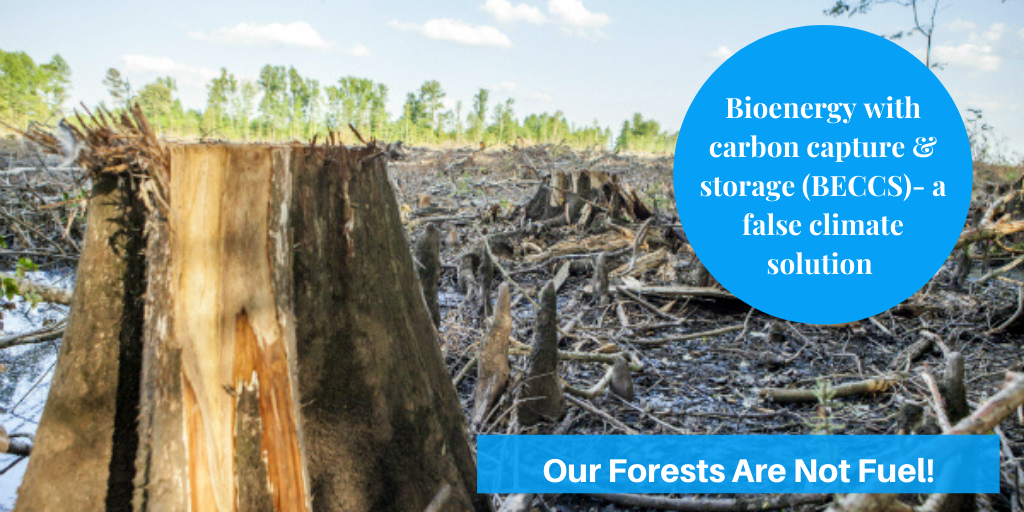
Edinburgh – 16th December 2020
Environmental campaign organisation Biofuelwatch warns that the Scottish Government’s updated Climate Change Plan for 2018-32, [1] published today, relies heavily on unproven so-called negative emissions technologies, especially bioenergy with carbon capture and storage (BECCS), which 18 NGOs in Scotland have warned risks worsening rather than mitigating climate change and poses high risks to nature.
An open letter sent to Scottish Ministers in September by NGOs including Friends of the Earth Scotland, RSPB Scotland, and Woodland Trust Scotland [2] had urged the Scottish Government “not to rely on speculative negative emissions technologies such as BECCS”. Yet, instead of engaging with the concerns expressed by environmental groups, the Scottish Government claims in its new Climate Change Plan: “We know that bioenergy will be important in helping us deliver negative emissions” and speaks not just of biomass produced in Scotland but also of future imports.”
None of the technology options for BECCS proposed in the updated climate Change Plan have been demonstrated at scale, if at all, anywhere in the world. [3] However, if they were to become commercially and technically viable in future, they would require large quantities of wood or crops grown for this purpose.
Sally Clark from Biofuelwatch states: “In order for Bioenergy with CCS to become ‘carbon negative’, burning biomass without CCS would need to be ‘carbon neutral’. However, hundreds of scientists have warned that this is far from the case. Forest ecosystems store and sequester large amounts of carbon and we need to protect and restore them, not log them at an ever-faster rate for bioenergy if we want any hope of stabilising the climate.” [4]
Sasha Stashwick, Senior Advocate with the Natural Resources Defense Council (USA) adds: “The Southeastern USA is the main supplier of wood pellets to the UK, especially to Drax power station in England, which is the world’s largest wood burner. Drax routinely burns pellets sourced from mature trees clearcut in highly biodiverse coastal hardwood forests. There is no ambiguity; burning this biomass increases carbon emissions and degrades forests—the very last thing you want to do in a climate and nature emergency. Drax speaks about plans to adopt BECCS technology on a large-scale in coming years. It’s therefore alarming to read that the Scottish Government wants to ask Westminster to adopt market and regulatory frameworks that support BECCS deployment. This would give the green light to Drax to burn more trees from our forests.”
Almuth Ernsting, also from Biofuelwatch, adds: “Growing crops or trees for energy on a large scale would have serious implications for land use in Scotland and elsewhere and would compete with the production of food as well as with natural ecosystems and our ability to restore some of those ecosystems which have been degraded and damaged. It is now widely accepted that biofuels from dedicated crops and trees result in high carbon dioxide emissions as a result of direct and indirect land use change. We would expect BECCS to have the same negative impact.”
Ends
Notes for Editors
[3] For references see the joint briefing on BECCS by Biofuelwatch and Friends of the Earth Scotland: https://foe.scot/wp-content/uploads/2020/07/BECCS-Briefing-from-Biofuelwatch-and-Friends-of-the-Earth-Scotland.pdf
